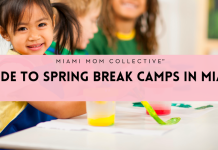Strolling through Target with one too many items in my basket because I refuse to wield a bulbous shopping cart, a woman from my running group stops me. “Hey,” I reply straining to balance all the items in one arm and holding out a list I clearly didn’t follow with the other. Seeing my struggle she goes on to mention, “Wouldn’t it be great if the men could do this?” “It’s just me,” I respond. This woman’s face contorts into what I can only imagine is feigned pity. “It must be so hard,” she says “I’m so sorry.” What?! I didn’t say my grandmother just died. I merely mentioned that there was currently no man in my life.

Step One: Don’t Assume
Don’t assume you know what another woman’s life is like. There are a number of reasons a woman may be raising a child sans partner. Firstly, they could choose to have a child on their own. I was fortunate to have a good job, health insurance, a supportive family, and friends (that are like family) when I chose to have a child on my own–a village! I happen to know that the woman I encountered in Target has a husband in the military. For all I know, she doesn’t have as much support as I do, but I don’t assume and make puppy dog eyes at her.
Secondly, a person who is raising a child on their own could have left an abusive or toxic relationship, and their life is now one hundred percent better than when they were raising a child with said person. There are probably hundreds of other scenarios where a person is raising a child on their own, but to assume that they are impoverished in some way is disempowering to the individual at best.
Step Two: Don’t Use the Term “Single Mom”
Yes, in a perfect world the words ‘single’ and ‘mom’ would mean just that–a single woman with a child. In our culture though, it carries with it socio-economic connotations.
One day after just obliterating my left glute in a roller derby accident, I was waiting to be called in for x-rays at a doctor’s office. When a female anchor’s voice boomed from the television overhead, “The child involved in the scuffle was already at a disadvantage, having come from a broken home, a single-mother his sole guardian.” This is what we hear in the media, on the street, and infer from strangers’ gazes when we’re just trying to run some errands–that “single-mother” and “broken home” are synonymous.
Then, there was the time I was at a funeral. A well-meaning friend was talking about a trip she wanted to plan in the summer with “the girls.” She wasn’t sure whether she should invite friend X because friend X was a “single mother,” and therefore couldn’t have any money for trips.
Is raising a child on your own expensive? Yes, ma’am. Should we have better societal resources and safety nets? In my humble opinion–absolutely. Yet, is it also possible to be financially stable and raise a child on your own? Yes. Let’s remember Taraji P. Henson has been a “single mom” since her son was in diapers. With a child in tow, she became worldwide famous and has made $25 million dollars to date.
Because of all the socio-economic connotations the term “single mom” carries, I much preferred the term “double-parent.”
This term would make me feel like a superhero, as in “I can do double what a normal mom does.” Obviously, I don’t compete with other moms in that way, but “double-parent” empowered me in a way “single-mom” never could.
Further, we don’t ever refer to someone as a “married parent”–making a married couple the standard and an individual parent the exception. If you’re wondering what your solo-parent friend prefers to be called, ask. And if they say “single mom” is fine, encourage them to reach for a more uplifting description of themselves. Words carry power.
Step Three: Stop Focusing On Her Dating Life
My mother doesn’t “do lunch,” so when she called to invite me to a quick meal at a nearby restaurant we’ve never been to, I was more than a little suspicious. I slid into the booth eyeing the perimeter like I was in a spy movie. “Stop, Kristen, maybe she really just wants to start having mother-daughter meals together,” I thought. The hummus dip landed on the table and I reclined for just a second when my mom blurted, “Have you tried dating apps?” I almost choked on my celery. What? Who is this person? My mother barely knows what the internet is and this person is describing to me the benefits of all the different dating apps.
I was stunned, but it was not a novel conversation. For some reason, having a child on your own makes everyone in your life start to worry if you’ll ever find a partner. I’m not a psychologist by any stretch of the imagination, but I believe it’s because worried friends can’t imagine a world where one, a woman can be okay raising a child without a partner, and two, a universe where a man would want a woman that already has a child or children.
I’d love to believe we’ve gotten past heteronormative, “Leave It To Beaver” societal norms, but alas, we have not. Six years of solo motherhood taught me that those two beliefs are deeply entrenched in our collective psyche. You notice friends that used to say things like, “Girl, you’re too good for him, find someone better,” start to say “He’s not that bad. I know he has a beer belly and he’s never read a book, but he’s good with kids.”
This leads me to my next step ….
Step Four: Be Her Cheerleader
Being a double-parent is not easy, but I would choose that kind of ‘hard’ over and over again. That’s not to say that during those six years of single-hood I didn’t have my fair share of low lows. It’s during these low times that you need your girlfriends to hold an exceptional vision for you. We don’t need other women projecting their fears onto us and telling us to settle. What we need is a cheerleader in our corner telling us to aim higher because we were made for more.
Step 5: Offer Support, Not Charity
There is one thing that is a little more challenging about being a double-parent and that is that we don’t often get time for ourselves when we most need it. Yet, that can be said of almost every parent. It’s important that when offering help, that we don’t present it as charity. I never enjoyed it when someone would say, “Let me take care of your child because I know how difficult it is for you.” I much preferred it when women treated me as their equal and would offer to trade child care.
For instance, “I’ll watch the kids one day and you can watch them the next.” Offering to participate in a carpool exchange for school drop-off is another great example. In contrast, there is nothing so demeaning as someone saying to a mother, “Oh, let me buy your child that toy. I know you’re tight.” When really you were trying to teach your child not to expect a reward every time you leave the house. If I wanted to buy my child a gift, I would, thank you very much.
Five steps are really not that much, but it’s the underlying work that’s at the heart of it. If you really want to support your friend, see her as the glorious individual that she is. Don’t ‘other’ her, and put her in a category apart from you. Do that and the rest of the steps will come naturally.

I got by with a little help from my friends …
















